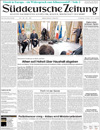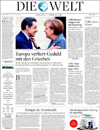In an interview jointly accorded by both leaders to the television networks France 2 and Germany’s ZDF in the wake of a Franco-German intergovernmental meeting on 6 February, Angela Merkel expressed her support for the French president, who has yet to announce that he is in the running for a second term. Her unprecedented move has prompted comment in the press on both sides of the Rhine.
For Libération, the Chancellor acted as a “press officer” for Nicolas Sarkozy, “officialising” his status as a candidate for re-election: a role which, the left-wing daily argues, is not without risk for the German leader:

It may serve to further reinforce France’s position of economic inferiority with regard to its partner, and give the impression that Sarkozy’s future campaign will be under German influence.
Receive the best of European journalism straight to your inbox every Thursday
For its part, Le Figaro does not contest the possiblity of German influence but simply remarks -

The much talked-about "German model", based on industrial competitiveness and budgetary austerity, is now the only viable option on a continent swept by the winds of globalisation. France is free to imitate it or reject it.
Rival daily Le Monde offers some insight into “why Mrs Merkel is campaigning for Mr Sarkozy,” who is lagging behind in the polls -

Mr Sarkozy and Mrs Merkel both have an interest in demonstrating that the couple is working as it has done in the past: the French President wants to give the impression that he is running Europe, while the Chancellor aims to show that she is not.
On its front page, Germany’s Süddeutsche Zeitung remarks that “courage has been transformed into high spirits” and offers an alternative analysis of the Chancellor’s motives -

Perhaps with the benefit of hindsight, 6 February will appear as a day when a desperate woman decided to clutch at straws. If Merkel believes the announcement made by socialist François Hollande [the candidate who wants to renegotiate the fiscal pact], she must be fearful of the consequences for her work in Europe. The socialist does not want to make cuts, but to relaunch the economy. The reality is that the Chancellor is not really fighting for Sarkozy in France, but for her own policies. And on this basis, her initiative may be reckless, but it is not irrational.
Conservative newspaper Die Welt makes no bones about its fear of Hollande while enthusiastically reporting that the two leaders have “at last come together for Europe” -

Although the contest will be determined by France’s 45 millions voters, this election concerns everyone in Europe. […] Its outcome could turn back the clock by years or even decades in Europe.
Was this article useful? If so we are delighted!
It is freely available because we believe that the right to free and independent information is essential for democracy. But this right is not guaranteed forever, and independence comes at a cost. We need your support in order to continue publishing independent, multilingual news for all Europeans.
Discover our subscription offers and their exclusive benefits and become a member of our community now!












